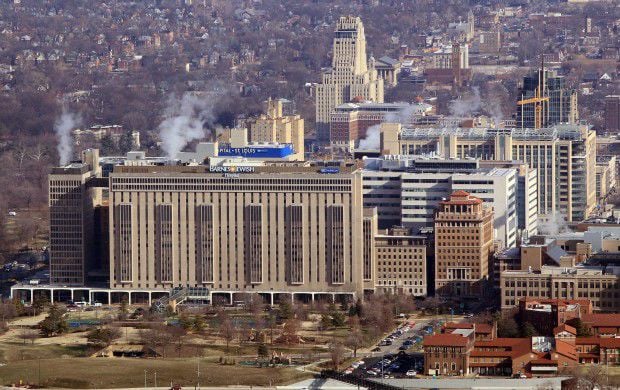
An aerial view of Barnes-Jewish Hospital complex in the Central West End on March 11, 2011. Photo by Christian Gooden, cgooden@post-dispatch.com
ST. LOUIS — Hospitals are still stockpiling protective equipment, telehealth is here to stay, and economic recovery won’t come quickly to the nation’s hospitals, BJC HealthCare President and CEO Rich Liekweg said in a wide-ranging interview with the Post-Dispatch.
Health providers across the world have been forced to adapt during the COVID-19 pandemic. Last week, Liekweg described the decisions and pivots at BJC, which runs 15 hospitals in Missouri and Illinois, and employs more than 32,000, making it the region’s largest single employer.
When the virus arrived in the U.S., BJC had to contend with the worldwide scramble to amass personal protective equipment, like gloves, gowns and masks, in order to protect patients and employees.
Back in March and April, the protective equipment market was “the wild, Wild West,” Liekweg said.
People are also reading…
Those in the medical supply industry reported demand growing to several times the normal levels, and providers in search of such items reported sky-high prices.
Though it has gotten better, Liekweg said, more recently the challenge has been acquiring PPE as businesses that are reopening across the country join the search.
BJC is stockpiling, Liekweg said, in expectation that COVID-19 will be present at least through the end of 2020, and also in anticipation of the upcoming flu season.
Liekweg also described the quick expansion of telemedicine — when doctors meet with patients online — which the system hadn’t broadly adopted prior to the emergence of COVID-19.
“We had just put our toe into the water with delivering care virtually to our patients,” Liekweg said.
With new limitations on in-person care, as hospitals endeavored to curb potential exposure to the coronavirus and preserve PPE, virtual visits went from a relatively small percentage of care to as much as 20% of outpatient visits for BJC.
“It’ll ebb and flow, I think, in years to come,” Liekweg said.
But broadly, he thinks telehealth is here to stay.
“I think over time it will continue to grow and become a larger part of the way we deliver care in the outpatient arena,” Liekweg said.
Times of transition
BJC HealthCare recently announced several leadership transitions, including a new president for Barnes-Jewish Hospital.
Liekweg explained that the moves were part of a succession plan, following the announcement that BJC group President Sandra Van Trease would resign at the end of July. “When you can promote from within ... that creates a lot of stability, from my perspective,” Liekweg said.
BJC officials also announced that they would hire for two new positions:
Nationwide calls for racial equity, plus health disparities between Black and white St. Louisans, made starkly apparent during the pandemic, led BJC to create a vice president of diversity, equity and inclusion, for which it is still recruiting.
And on Friday, the hospital announced that Washington University professor Jason Purnell would become BJC’s new vice president of community health. Purnell led a team that published the For the Sake of All report in 2014, considered a seminal work on the disparities in health outcomes between Blacks and whites in St. Louis.
The hospital called Purnell “an impactful leader of change.”
Liekweg said the mission was essential.
“We need to make sure inside BJC that we’re creating a sense of belonging for all team members, and that we provide culturally aware care for all of our patients,” Liekweg said. “We want to make sure that we’ve got the expertise internally to ensure that we achieve sustainable change in embracing diversity, equity and inclusion for all.”
Economic recovery
Liekweg said he does not expect an immediate, economic recovery for providers.
BJC will likely still feel the impact in 2021 and maybe beyond, he said.
The system has brought back about half of the nearly 3,000 employees it furloughed in May, and expects to bring back more in the weeks ahead, he said. Patient-facing positions have been the fastest to return, as hospitals resumed elective care.
BJC now has about 31,000 employees, in total.
Funding from a federal coronavirus relief bill, the CARES Act, has been helpful, Liekweg said. But it did not come close to replacing the income from canceled elective care procedures.
He said the economy, and health providers, will continue to need federal aid.
BJC now projects it will end the calendar year with an operating loss. Typically the system budgets for a 2% to 3% operating margin.
“But we’ll weather that storm,” Liekweg said.
Like other industries, he said, they will recover. But if there is a rebound in COVID-19 cases in the fall, the financial impacts could last 18 to 24 months.
“We will all adjust,” Liekweg said. “We’ll take advantage of the virtual care. But it’ll be a slow recovery.”







